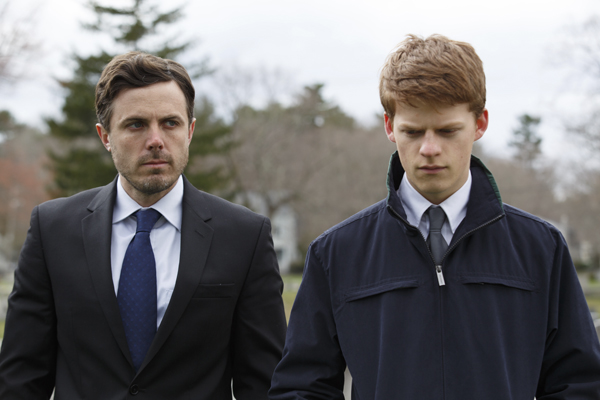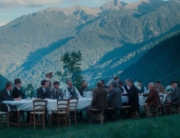![]() Playwright-turned-filmmaker Kenneth Lonergan takes a pointillistic approach as a storyteller. Bit-by-bit, he doles out well-timed exposition as his film quietly lays down its cards. At first glance, the storyline feels scattered. However, by the end, it has become an expansive and immersive work that comes into focus—and explosively so.
Playwright-turned-filmmaker Kenneth Lonergan takes a pointillistic approach as a storyteller. Bit-by-bit, he doles out well-timed exposition as his film quietly lays down its cards. At first glance, the storyline feels scattered. However, by the end, it has become an expansive and immersive work that comes into focus—and explosively so.
Manchester by the Sea moves along like a novel made up of vignettes that go back-and-forth in time. The script’s inner logic centers on the frailties and flayings of a Boston blue-collar handyman in his mid-30s, Lee Chandler, and the unraveling mystery behind his departure from his Massachusetts hometown. (It wouldn’t be a scenic New England town if it didn’t hold any secrets.) Yes, he’s an angry, working-class white male without a college education, but his resentment doesn’t come from without but from within, and he doesn’t stifle it very well. He flippantly talks back to clients—he’s too young to be called a curmudgeon—and sitting alone at a dive bar, he’s a loose, ricocheting cannon, attacking a well-heeled man at a bar for looking at him the wrong way, or at least that’s his excuse.
This deceptively straightforward drama packs a wallop, which is especially noteworthy considering Affleck’s contained performance. Watching actor Casey Affleck, who looks like an eternally youthful choir boy, fight his inner demons is worth the price of admission alone.
Lee is called back home to coastal Manchester-by-the-Sea (population 5,000) after his older brother and only sibling, a fisherman named Joe (Kyle Chandler), has died of cardiac arrest at age 40. At the hospital, Lee’s expression freezes into an immobile mask. A man of few words, he’s practically monosyllabic, standing rigid with his hands in his pockets. At times, his performance is so subtle that if you blink, you might miss a clue to his sense of isolation.
Joe has left behind a 15-year-old son, Patrick (a very good Lucas Hedges), a gawky and cocky big man on campus. No one knows where his mom is; she left town years ago, and according to the terms of Joe’s will, Lee will assume the guardianship of the teen so that Patrick can remain living in his hometown. Stymied and in shock, Lee refuses; he doesn’t want to come home again. To counter any of his arguments, the will has provided $5,000 for his moving expenses. Lee begrudgingly agrees to the arrangement even though he and his nephew are close; the film opens with the two of them fishing with Joe out on the water. (Patrick’s gung-ho temperament dispels the mournful mood. Besides playing hockey and in a rock band, Patrick has two girlfriends, neither of whom knows about the other.)
Though the film has been cast with well-known stars—from Affleck to Michelle Williams and Matthew Broderick—the actors are convincingly at home, in large part because it feels as though the characters, crusty and guarded Yankees, inhabit a specific hamlet. In contrast to films that are art-directed to death, this one seems thrown together: homes are messy, and a minimally-furnished bedroom is a sign of a strapped income, not a decorative aesthetic.
The acting is all-around nakedly vulnerable, especially when Lee tries to keep his feelings in check, and it’s hard to imagine another American film this year with as many fine acting moments. The film builds to two exceptionally powerful scenes, one of which features Williams as Lee’s ex-wife, Randi. The cast is so strong that you can overlook some low-budget shortcomings: the seasons change during the course of one afternoon, from snowy to spring and back to frosty winter.
Lonergan’s not the first American playwright (Sam Shepard, for one) to make the transition to film and to deal largely with the emotional restraints of a certain type of American male and his attempt and failure to change his life. The inability for self-reinvention, the source of the melancholic movie’s tension, is not just limited to Lee. Randi physically transforms in her few scenes, from disheveled hausfrau with a head cold to undergoing a sleek, bobbed makeover. To say she has unfinished business with her ex-husband would be an understatement. Gretchen Mol, likewise, has limited screen time as Patrick’s mom, a former alcoholic who has remarried and become an evangelical Christian. She, like Lee, hits a brick wall; they can let go of the past only so much.
This is one of the best films that Amazon Studios has acquired so far. Though a theater’s widescreen takes advantage of the natural environment, it will play well in all platforms because of its intimacy. It’s also reminiscent of the best of television, as if Lonergan had all the time (and luxury) of a television season to construct his story with such depth.







Found this movie a repetitive, morose bro-fest where no one learns a thing and women are either there to prop up men or to get in the way. Not feeling the critical love for this film!!!